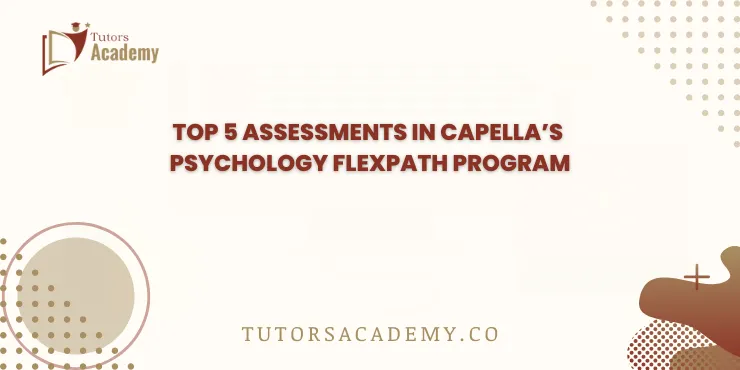
Top 5 Assessments in Capella’s Psychology FlexPath Program
Are you interested in enrolling in the FlexPath Psychology program at Capella? This self-paced approach uses realistic assessments to evaluate your abilities. You’ll take assessments that challenge you to think, apply, reflect, and develop in addition to testing your knowledge.
These are five of the most relevant assessments you will probably come upon in the Psychology FlexPath program.
Top 5 Capella Psychology FlexPath Assessments
In the Capella Psychology program, there are the following five important assessments that every student encounters.
Top 5 Psychology assessments | Course Aim | Tested Core Skills |
Case Study Analysis | Psychological Abnormalities | Clinical Evaluation |
Research Proposal | Overview of Research Methodologies | Scientific Design |
Behavior Change Plan | Behavioral Principles | Application of Behaviour |
Cultural Competency Reflection | Social Psychology | Awareness of Culture |
Literature Review | Capstone Project | Research Integration |
1. Psychology Case Study Analysis
The case study analysis is one of the most effective types of psychology FlexPath evaluations. This psychological assessment is very applicable to the workplace. A thorough client case study is provided to you. The client exhibits signs of a mental illness. It is your responsibility to examine their behavior and relate it to a potential diagnosis. You have to follow the DSM-5 criteria and provide reliable research to back up your diagnosis. Critical thinking abilities are developed through this exercise.
2. Research Proposal/ Research Methods FlexPath Assessment
A study proposal or design assignment is another basic psychology assessment. It is typically connected to research methodology courses. A small-scale psychological research will be conducted by you. It must concentrate on a certain, quantifiable subject. Along with discussing any ethical issues, you describe the study topic, methodology, and instruments. This assignment teaches you the fundamentals of scientific inquiry and provides a solid basis for more complex work in the future.
3. Behavior Change Plan / Applied FlexPath Assignment
You might be required to create a behavior modification plan in some courses. In this practical project, you must develop a thorough strategy to alter a certain behavior. You may exhibit this conduct on your own or in response to a particular situation.
You take into account outcomes, triggers, and reinforcements while using fundamental concepts from behavior analysis. Measurable objectives and a tracking system must be part of the strategy. This assignment enables you to see psychology in everyday situations.
4. Cultural Competency Reflection
Psychology is not an isolated field. Culture, identity, background, and society all influence how people behave. As a result, reflection-based assessments are used in certain psychology courses. You select a social psychology topic that involves group dynamics or prejudice. You examine its applicability to actual occurrences.
You consider your own cultural perspectives as well. Working with various groups requires awareness, which is developed via this activity. It facilitates the development of empathy and moral reasoning.
5: Literature Review: Psychology Capstone Project
Lastly, you will frequently have to complete a capstone-style evaluation at the conclusion of this Flexpath program. This is frequently your last assessment when you choose an important psychological subject. After that, you search widely for peer-reviewed publications. You compare and summarize these sources. This illustrates your ability to do research and synthesize information. It compiles all of your knowledge and gets you ready for professional writing and research.
Conclusion
The Capella FlexPath psychology assessments push students to use critical thinking skills and apply theory to practical situations. These assessments guarantee that you graduate with competence, self-assurance, and a better comprehension of human behavior. To put it briefly, these evaluations help you become a professional practitioner. You will succeed if you remain focused and make use of your resources.
Boost your grades and master Capella’s Psychology FlexPath assessments with Tutors Academy’s expert guidance. Start today!
Frequently Asked Questions
Answer 1: Although they might be difficult, their purpose is to help you develop practical skills rather than memorize information.
Answer 2: Yes, you may edit and resubmit psychology assessments with FlexPath until you show expertise.
Answer 3: Depending on their individual speed and level of difficulty, most students require one to three weeks for each evaluation.
Answer 4: You can follow the APA writing style to write these FlexPath assessments.
Answer 5: Because it demands a synthesis of what they have studied, many students consider the capstone/literature review as the most difficult.
